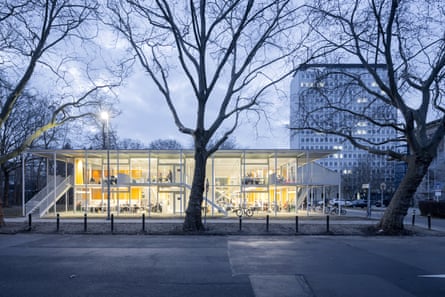‘It should feel like an extension of the living room’: radical study centre is named best building in Europe | Architecture | The Guardian

The project has already garnered wide recognition in Germany, winning the national architecture prize from the Deutsches Architekturmuseum, and hailed by one newspaper critic as “what the future of German construction could look like”. In a time of scarce resources, it has been praised for being as lean and economical as possible: everything has been stripped back to the bare minimum, honed to its most essential elements to fit within the total €5.2m (£4.47m) budget (€3.2m for the construction).The project is all the more impressive given that it is the architects’ first ever building. Düsing, 40, and Hacke, 38, entered the competition in 2015, just a couple of years after graduating from London’s Architectural Association, where they had met as students. They now both have independent offices in Berlin, but come together to collaborate with others when needs arise. “It’s a survival strategy,” says Hacke, of their loose network of seven. “We can work together when we need a bigger workforce, then go back to our smaller structures.” It is a nimble model of practice that is as agile, efficient and adaptable as the building itself.The last winner of the EU Mies award, in 2022, was a similarly open-plan and adaptable building for Kingston University, the palatial Town House designed by Grafton Architects. Previous UK winners include Stansted Airport in 1990 and Waterloo Station in 1994, but there will be no more: since Brexit, British buildings are no longer eligible for the €60,000 EU prize.